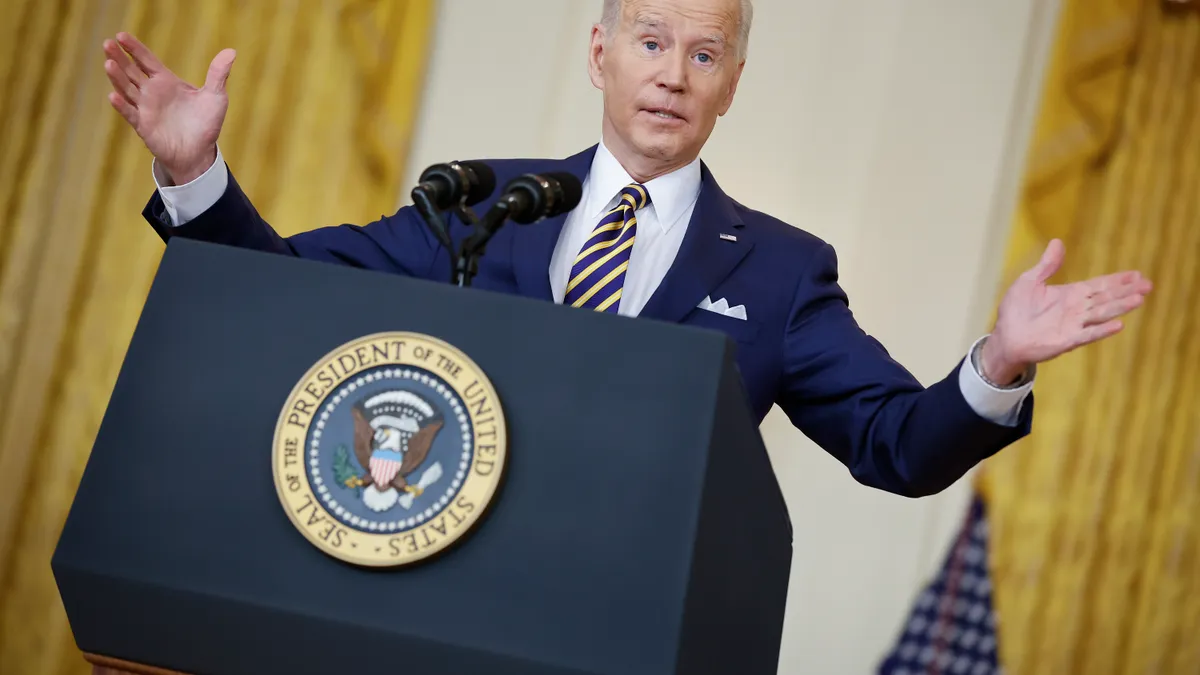Dive Brief:
- The Biden administration's proposed fiscal 2023 budget, released Monday, dedicates $50 billion to increasing the nation's affordable housing supply through federal grants and loans.
- The proposed budget also calls for $71.9 billion in discretionary funding for the U.S. Department of Housing and Urban Development, a 21% increase from 2021 enacted levels. That includes an expansion of the federal Housing Choice Voucher program, with $6.4 billion in increased funding over 2021 levels, that would serve an additional 200,000 households.
- President Joe Biden had previously sought historic funding increases for housing in the Build Back Better legislation that failed to pass the sharply divided U.S. Senate last year. While members of Congress from both parties have already signaled changes they plan to make to the budget, which requires congressional approval, the proposal shows the administration continues to prioritize addressing the nation's housing crisis.
Dive Insight:
The cost of housing has skyrocketed in many urban regions across the U.S. Over the past few years, the cost of buying a home has become out of reach for many, and rising rental costs have resulted in more people falling behind on their rent, being evicted and experiencing homelessness. Housing experts say the rising costs are largely due to a lack of housing to accommodate population growth in cities.
The Biden administration tried to address the issue through the Build Back Better legislation, which allocated $150 billion toward affordable housing. That included billions for expanded rental assistance, the preservation of public housing, and the construction, preservation and operation of affordable housing units. While the bill passed in the U.S. House of Representatives, the administration failed to garner the support of 50 senators, including two moderate Democrats, and the legislation is likely dead.
Presidential budgets rarely ever pass through Congress as proposed, even when the president's party controls both the House and the Senate, but some prominent housing groups and advocates have expressed support for the housing provisions this proposal contains.
"This unprecedented investment demonstrates how seriously the White House views the supply crisis," the National Association of Realtors' Chief Advocacy Officer Shannon McGahn said in a statement, adding that the group worked with the administration and Congress on "comprehensive policy proposals."
The proposed budget would increase funding for the federal HOME Investment Partnerships Program, a grant program for state and local governments to construct and rehabilitate affordable rental housing and provide homeownership opportunities, to its highest funding level in about 15 years, the White House stated. It also provides money to build 2,000 units of affordable housing for elderly people and people with disabilities.
Most significantly, the budget also dedicates $50 billion in funding and additional low-income housing tax credits to increase the nation's affordable housing supply and stabilize housing prices long term. That includes $35 billion in funds that would allow state and local housing finance agencies and their partners to provide grants, revolving loan funds and "other streamlined financing tools" to reduce transactional costs and increase the housing supply. Those grants also would support state and local efforts to remove barriers to affordable housing development.
The budget "charts a course for a better future — one where every person has access to a safe, stable home and a fair shot at opportunity, security, and a better life," HUD Secretary Marcia Fudge said on Twitter.
The budget increases the number of federal homeless assistance grants that would be distributed, provides grants to support state and local fair housing enforcement organizations, and provides homeownership assistance to first-time and minority homebuyers, among other measures.
The National Low Income Housing Coalition praised the expansion of Housing Choice Vouchers, rental assistance that helps low-income people pay for housing on the private market. Housing experts say the program is significantly underfunded.
“For the second year in a row, President Biden and Secretary Fudge propose the largest single expansion of Housing Choice Vouchers in the program’s history,” NLIHC President Diane Yentel said in a statement. But, she added, both the additional money in the proposed budget and Build Back Better are needed to end homelessness and put the U.S. on a path toward providing universal housing vouchers.
"It’s time for Congress to make the long-overdue and badly needed investments in solutions to get and keep the country’s lowest-income people stably housed," Yentel said.












